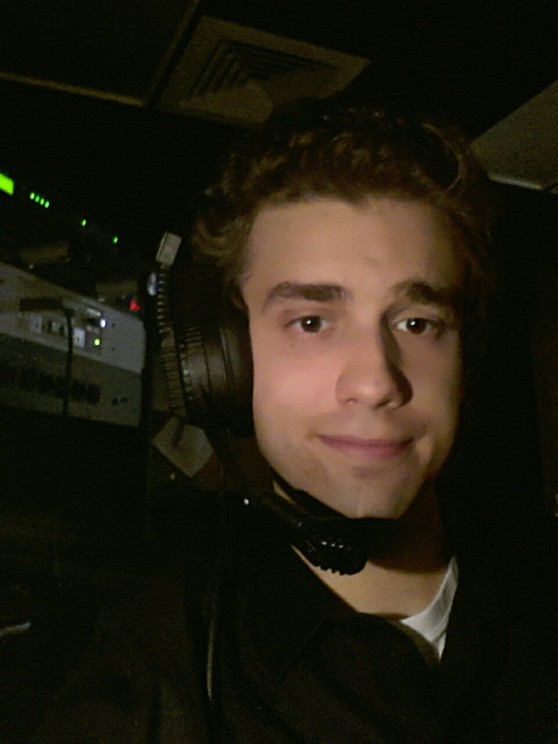As it happens-and somehow, it happened-I’m developing a video game. Writing and directing, to be more specific. It’s a visual novel game with light point-and-click elements, in which players guide a protagonist through various situations and conversations, working toward one of many possible outcomes. The game will have original character art and backgrounds, original music, an original script, and some original implementations of classic game design. Development is already well under way, and I have plans for all stages of production, including crowdfunding, as well as some fundraising ideas to create hype for the upcoming game and publication. Not bad for a penniless indie developer, huh?
But I’m not undertaking all of this myself, nor am I commissioning these assets from freelancers. I’ve built a team, still growing: A man in Missouri is co-writing the plot and dialogue with me, a girl in Louisville is composing the music, and a Transy graduate is leading the programming. We meet on Skype at odd hours, always brainstorming and building the next stage.
Our team reached this working stage within the span of a few months, through a few phone contacts and social media platforms. I released no official ads, posted on no game development forums. I simply asked my friends, and they responded-easy as that. If you’re still nursing doubts about that “really-big-thing-of-your-dreams,” whatever it is, I hope that the history of my development team will convince you and your friends to take the creative plunge together.
Since the objective was simply to have fun creating something, we didn’t hesitate.
Late last May, I had been dating my girlfriend, Kaira, for about two months. By that time, though we already had a strong emotional bond, we were both hoping to connect creatively as well. Yet her mind is very mathematical, while mine is very literary; she composes music, and I write prose. The difference is stark enough that past attempts to cross the line weren’t very successful. So few long-term projects came to mind that incorporated our respective talents equally-until I suggested a visual novel game. We both enjoy video games, she had made some fairly complete games in high school, and the demands of a visual novel seemed comparatively low. Since the objective was simply to have fun creating something, we didn’t hesitate. Without the usual expectations of young artists trying to prove themselves, we could work without doubting the value of what we were making.
At that stage, I thought we would be lucky if the final product were playable just for our own enjoyment. But as Kaira and I brainstormed for hours, jotted notes, wrote scenes, and composed music, I was drawn into this project like none other. Ideas were bouncing off each other with such ease-notes developed into characters, which inspired music, which in turn inspired new settings and scenes-and soon, the quality of what we were making became apparent. It reminded me of some old collaborative writing projects with a friend, which brings me to the second person on my team.
William and I used to manage large-scale collaborative fiction online, and we remained good friends after the host site fizzled into inactivity. We talk into the wee hours about literature and language and film and games and so much else; he was the perfect cowriter, if ever I were to have one. A few shared documents and Skype calls convinced him to join the team, and then we jumped straightaway into the research process. Each of us read literary and historical source material, watched shows, studied documentaries, played quite a few games-and then we discussed them for hours. Slowly we defined the shape of this game, the ins and outs of its mechanics, all while building characters and their storylines. And whenever I questioned the project’s chances of success, I looked at all the amateurish visual novels sold on Steam-stuff that would make you cringe, blush, and puke in your mouth. If they could get published, so can we. By analyzing the best and worst in your field, you do more than assure the quality and uniqueness of your work; your team develops a sense of what is feasible. Once you have a grasp of your collective abilities, you can maintain reasonable expectations that keep that early confidence intact.
Research and early writing spanned nearly the entire summer. Meanwhile, Kaira kept on composing and uploading, and had already secured us several live musicians and a recording studio for the soundtrack. From this wealth of new material, William and I compiled a preview package on Google Drive, to present the game to potential hires. Afterward, I inquired on Facebook about artists and programmers, and the talented Michael Huelsman (’16) answered. He reviewed our preview package, found the terms of early dev work reasonable, and joined as our lead programmer. Just like that! No ads, no bargaining with faceless Internet strangers. Making plans with a friend is much easier than negotiating an unreliable contract with a stranger, so turn to your contacts before listing publicly.
All around you, people-your friends, your acquaintances, people within your reach-are looking to create something meaningful.
And that, ultimately, is the point of this unflashy story: It’s easier than you think. The project itself still demands work, and this work will only increase with time. As director and project manager, the final responsibility for this video game lies with me-I’m this brainchild’s primary caregiver. Yet I can provide for it, all the same. Endeavors of this scale don’t belong only to commercial studios. All around you, people-your friends, your acquaintances, people within your reach-are looking to create something meaningful. Offer them that chance, offer them your talent and support, and together you can create something great with much less time and toil than it would take alone. “Teamwork makes the dream work,” and teamwork isn’t much work at all.



